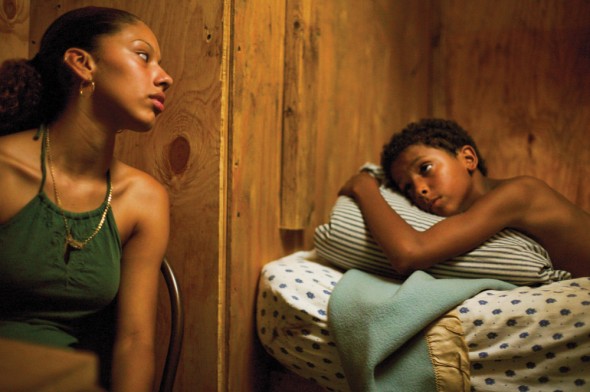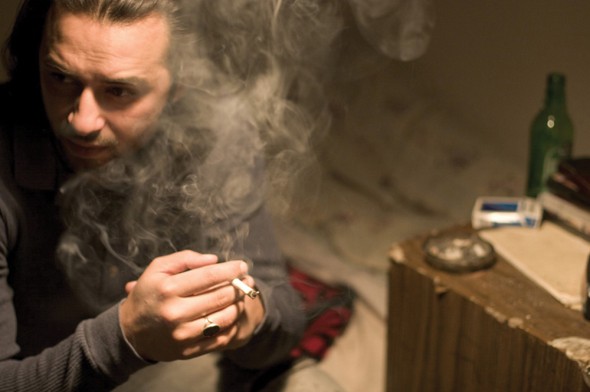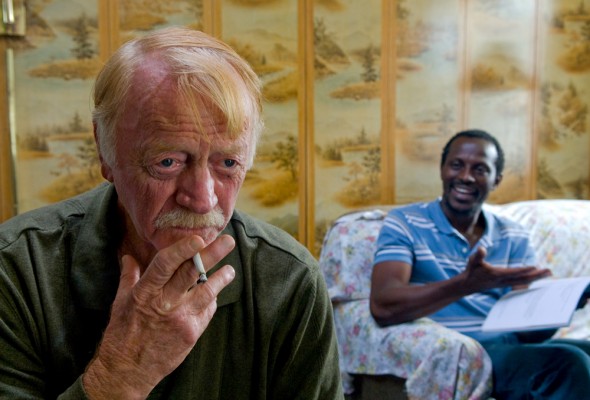
Orphaned siblings Isamar and Alejandro working and living in Chop Shop
The story of contemporary auteur Ramin Bahrani
There is a moment in the 2008 Spirit Awards that gives a glimpse of how out of touch mainstream Hollywood is to-wards independent filmmakers; particularly Ramin Bahrani. American born and raised, Bahrani was given the “Someone to watch” award for Chop Shop, the story of a adolescent Latino orphan who hustles money on the streets and auto body shops of Queens. Awards host John Waters, quoting the awards committee, called the film “a harsh yet exquisitely-detailed vision of desperate characters in a third world society…that happens to be located in New York City.” A familiarly voiced movie trailer voiceover actor/announcer then proceeds to call Mr. Bahrani “Marim Barami.”
It seems that Bahrani makes films that mainstream Holly-wood doesn’t want to consider American. But whether it’s the Sisyphean struggles of a Pakistani push cart vendor, a Latino orphan, or a Senegalese taxi driver, the writer/director captures the American spirit in all its rugged, individualist romanticism in a masterfully crafted, neo-realism style that has led to critic Roger Ebert calling him “the new great American director.”
Is the decision to make films small and independent intentional? Do you do it in order to keep your own vision?
There was really no opportunity to make Man Push Cart with any more money than it was made with. I was a complete unknown, making a film about a man operating a push cart—working day after day, setting up the coffee in the push cart…you’re not gonna get a lot of people throwing money at that [laughs]. Nevertheless, the film was made the way we wanted to make it. I’m going to shoot a period piece next year—a Western—and I want to shoot it on high definition 35mm, which is nearly a dead medium.
Did you write this as well?
I’m finishing the rewrite of it now, I’m getting together some of my actors already, because I’m writing for certain people specifically.
Is it going to be an anti-Western Western, something dark or subversive?
It’s certainly not bright. It’s quite a horrific time period. Civilizing the West was not so civilized. Whatever I do would be incapable of capturing the true horrific nature of that time.
You say that you weren’t able to capture it all—do you feel that you hold back in some of your other films?
Well [with the Wild West] I just don’t think that it’s possible to tell the true horrors of it. I was just looking at Apocalypse Now last night, and it’s a frightening film. And a lot of the horrific elements of it are expressionistic. I don’t want to say a person does or doesn’t hold back. Film is a cut and paste and collage of the world; you never really encompass it ent-irely. I am trying with each film to encompass more. I think that Chop Shop had a little more ups and downs than in Man Push Cart; and I think that Goodbye Solo was an attempt to grasp at even larger themes: life and death, hope and des-pair, the desire to help and the rejection of that, the fragility of it all. I hate to use the terms “bigger” and “smaller” because they seem to equate with budget.

Ahmad Razvi stars in Man Push Cart
As an Iranian American, do you think that audiences think of you as Iranian first and American second; does that bother you? Do you think that your heritage informs the stories you tell?
I think focusing on where my parents are from puts a narrow lens on my identity and, more problematically, on my films. All of the reviews of my films insist on saying “Iranian American Ramin Bahrani,” or something insinuating that I am an Iranian émigré—I’m not sure what relevance this has in the films since none of them are about Iranians. Is my heritage impor-tant to me? Of course it is, but neither my identity nor my cinema is defined by it. I was born and raised in Winston-Salem, North Carolina, and have lived in America for 32 of 34 years of my life and have made three distinctly Ameri-can films.
Why do you feel they are distinctly American?
America is a country founded by immigrants, and a country that constantly re-identifies and re-invents itself by new immigrants. If we look at the people on Wall Street or suburban America, the names aren’t only Jones and Smith—the names are increasingly Ghosh, Sanchez and Lee. And those are American names now.
And my characters are American, and by that I mean incredibly stubborn and individualistic [laughs]. In the three films, I think particularly in Man Push Cart, the characters reject their tradition the same way that they reject assimilation—they want neither. They are doggedly their own, in terms of American history and in terms of art and literature and specifically to the transcendental writers of the 1850s.
I guess we’re used to hearing stories of the impoverished as somewhat victims of circumstance—not these stubborn individualists.
The characters in the three films are not only connected by their immigrant and economic status, but also because they are all outsiders with large visions and dreams and ways of living that are in danger of being smashed by the world. In Goodbye Solo, the taxi driver is an outsider because of his generous heart, spirit, and selfless love that baffles and subverts our traditional belief system. The main characters in my upcoming film are all outsiders in a different way—you’ll see when it comes out.
Also, you may not know this, but when Man Push Cart hit the screens in Venice, one of the trades said that I was Pakistani. When Chop Shop premiered at Cannes, the trades said that I had made a film about two Iranian street kids in New York.

Red West and Souleymane Sy Savane in Goodbye Solo
Wow. How do you decide to tell these stories? Does the inspiration for these characters come to you from everyday life?
Each one is different. For Man Push Cart I’d never seen a push cart vendor as a subject of a film. The job, the occupation; the physical struggle—I thought about the Myth of Sisyphus. Not just the myth itself, but Albert Camus’ interpretation of the myth, which he used to encapsulate the idea of the absurdity of life. It had always been an important book to me, and Man Push Cart seemed like a chance to create a modern version of that myth. It was my small Fitzcarraldo.
With Chop Shop it was seeing that location for the first time, and I spent more and more time there, talking to the people, kids, etc. Goodbye Solo originated with a taxi driver from Senegal who was extremely friendly and charming.
Could you tell me about some of your inspirations as a filmmaker? You mentioned Herzog…
Yes. I admire Werner Herzog very much, and had a chance to work with him on a short film I just finished, Plastic Bag, that I premiered in Venice, Telluride and NYFF. He supplies the voice of the bag! I also admire Francis Ford Coppola’s recent work.
– Amity Bacon

